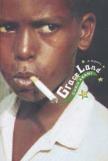Oke's Odyssey
If Chinua Achebe and Wole Soyinka are arguably the grandfathers of Nigerian literature, and Ben Okri and Buchi Emecheta are their successors, Chris Abani, Chimamanda Adichie and Helen Habila would appear to be coming into their own these days as the next wave. Adichie, author of Purple Hibiscus (Algon- quin, 2003), tells the story of a fanatical Catholic father and his stranglehold on his family during Abacha’s military regime in the 1990’s and Helen Habila, author of Waiting for an Angel (Norton, 2004), offers a description of Poverty Street in Lagos in the 1990’s. In GraceLand, Abani uses the experiences of a young adolescent, ironically named after Elvis Presley, to suggest the larger pattern of squalor and hopeless dreams that continues to define Nigeria.
Abani, a visiting assistant professor at the University of California at Riverside, is the recipient of the 2001 PEN USA Freedom to Write Award and a 2003 Lannan Literary Fellowship. He is best known for his poetry, including Daphne’s Lot (Red Hen, 2003), about his English mother, and Kalakuta Republic (Saqi, 2001), about political incarceration. He knows something about the latter, since his first novel, Masters of the Board (Delta, 1985) earned him six months in solitary confinement. He wrote the novel when he was just 16one wonders, how seditious could it have been?but the government argued that his plot laid the groundwork for a political coup. He was soon picked up again, and this time held for a year in a maximum security prison. Friends finally bribed the authorities and effected his release.
For Abani, the tyranny of the state is reflected in the tyranny of the family. Thus, GraceLand is the story of an adolescent, Elvis Oke, who lives with his father and stepmother in Moroko, a notorious slum on stilts over a fetid swampland in Lagos. Throughout the story Abani plays on the traditional use of names as talismans, generally inverting their surface meaning. Thus, the stepmother’s name is Comfort, but she is cold. His dead mother’s name is Beatrice, but she is no longer present to guide him through this hell. His father is Sunday, but he has no access to rest or transcendence. Elvis himself cannot sing or dance, and his hopeless impersonation of his namesake for white tourists is painful to imagine. He is pulled in two directions: the revolutionary King of Beggars wishes him to stand up against the corrupt regime, with predictable results; the pragmatic and corrupt Redemption, on the other hand, is a character much like Dickens’s Artful Dodger, who introduces Elvis to drugs and to the kidnapping of children for export to Saudi Arabia and the sale of their internal organs to rich Americans.
There are light moments in the book, but these are quickly submerged by the sadness, the rape of the boy by his uncle and the forced prostitution of his missing cousin. Most powerful of all are the scenes of the boy’s torture near the novel’s end. This is no surprise, since Abani himself was given daily beatings during his first incarceration and was tortured during his second.
Each chapter begins with a recipe and a fragment from the rubric for the kola nut ceremony (a rite of passage into male adulthood). This device is not particularly effective, but Abani remarks that his intention is to set the specifics of the plot against the broader sweep of Nigerian culture. Urban squalor is immediate, but Abani wants readers to imagine a possible future building on a rich cultural history. Yet his characters have little chance to do so. The climax of the novel comes with the government’s Operation Clean the Nation, in which all slums are bulldozed. In another novel, the resistance offered by those who live in these slums might be the cause for some romanticized hope and reaffirmation of a common humanity. In Moroko, it is simply the final example of the intransigent inequity of conditions in many countries that have been used for years as convenient sources to fulfill the needs of wealthier nations. The final ironic talismanic name, of course, is the book itself. The only Graceland is that of one’s own making, cut off from God, nation or family, desperately scrabbled together from the garbage that can be guarded from one’s neighbor.
This article also appeared in print, under the headline “Oke's Odyssey,” in the August 2, 2004, issue.








